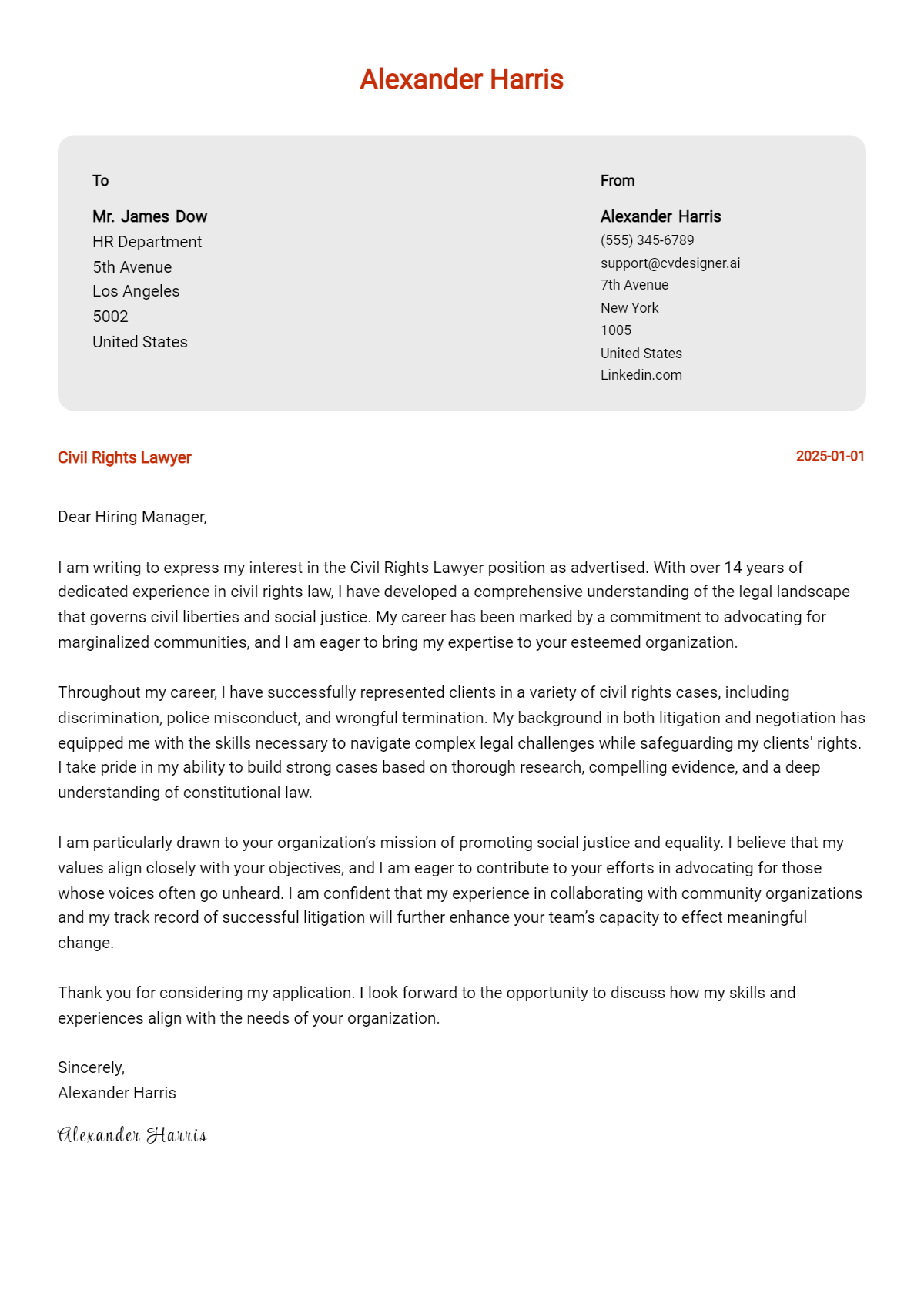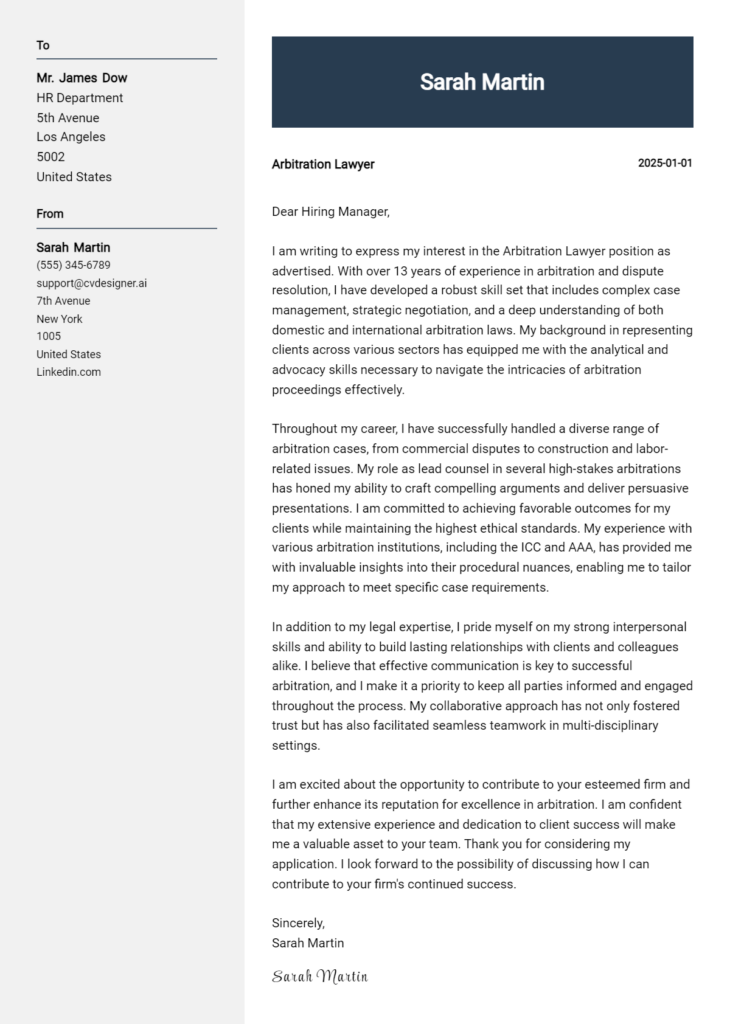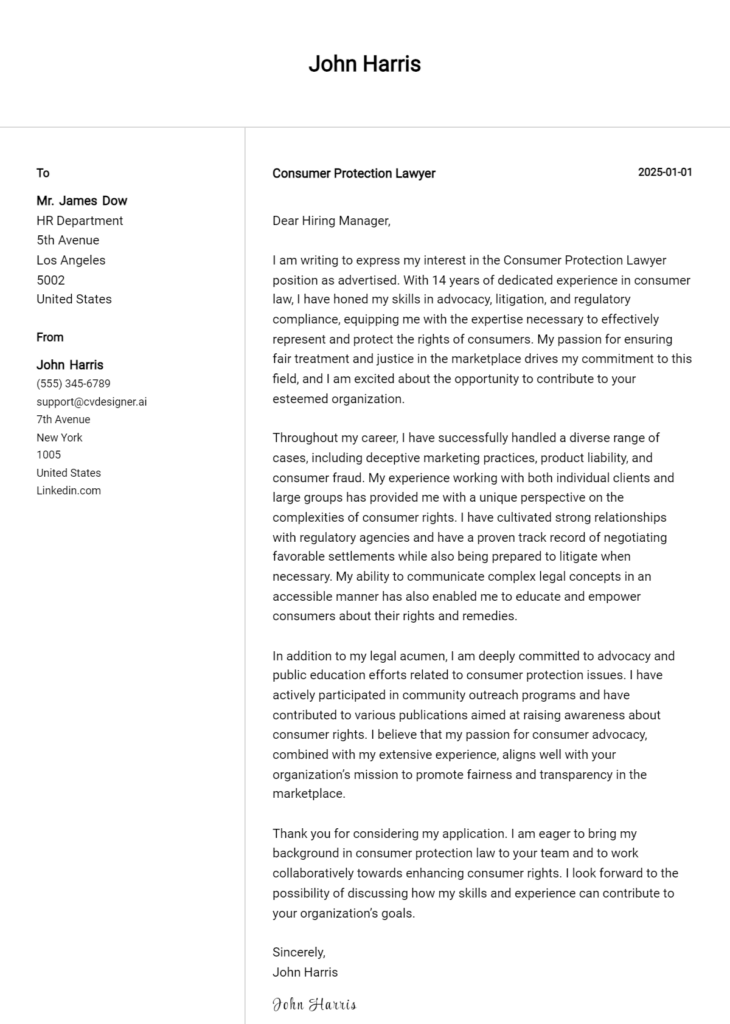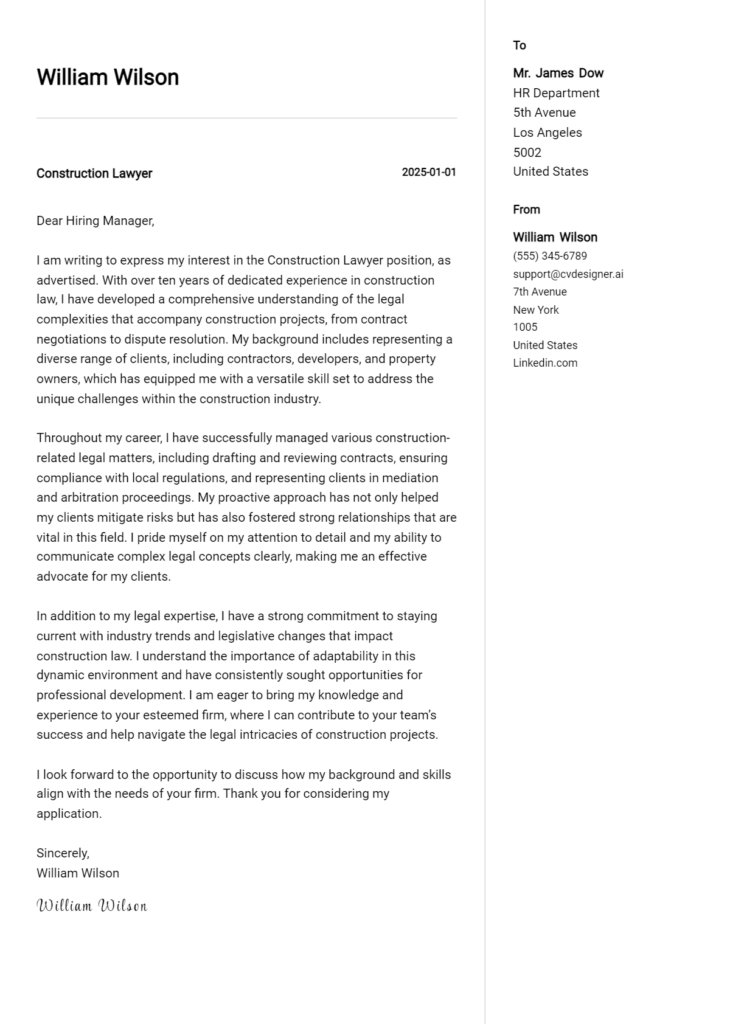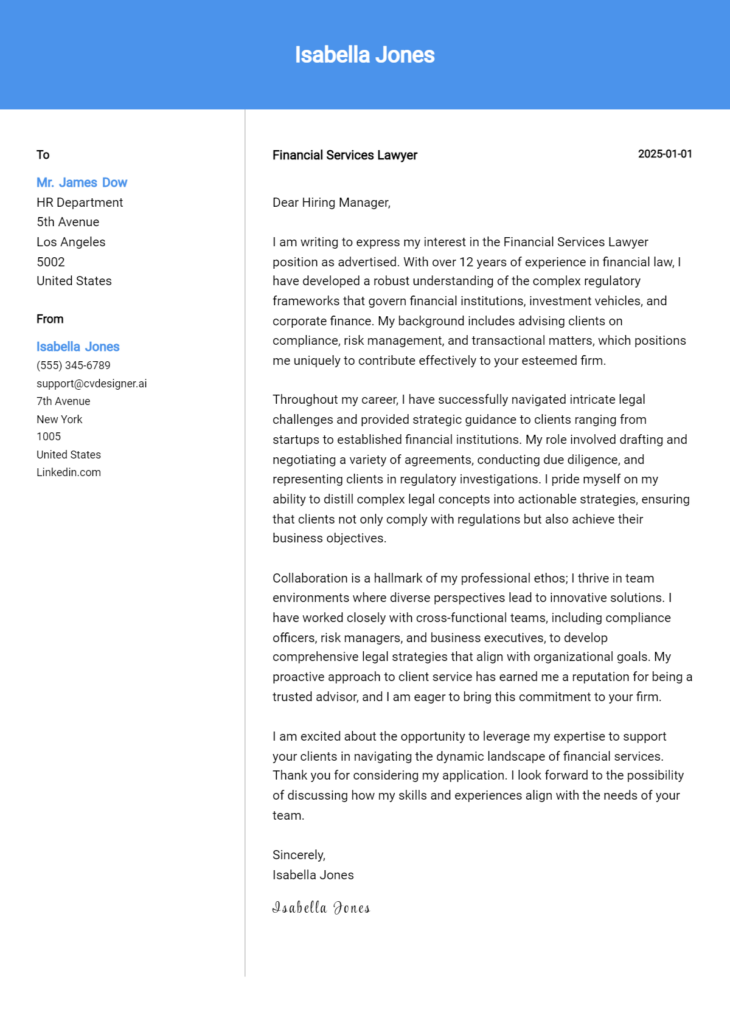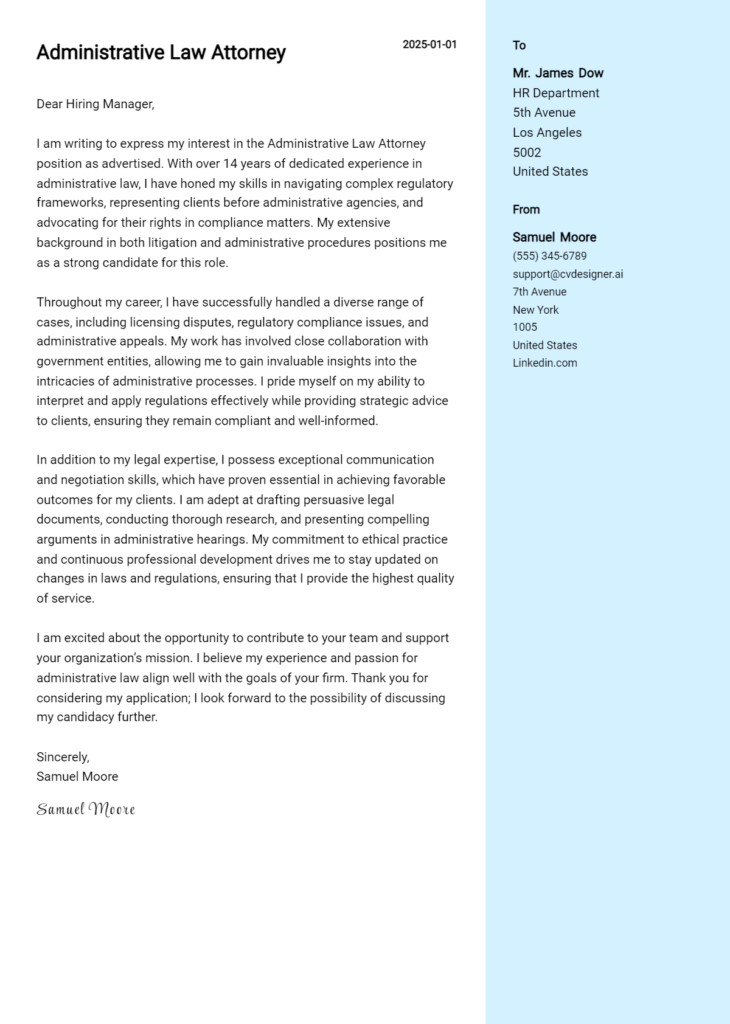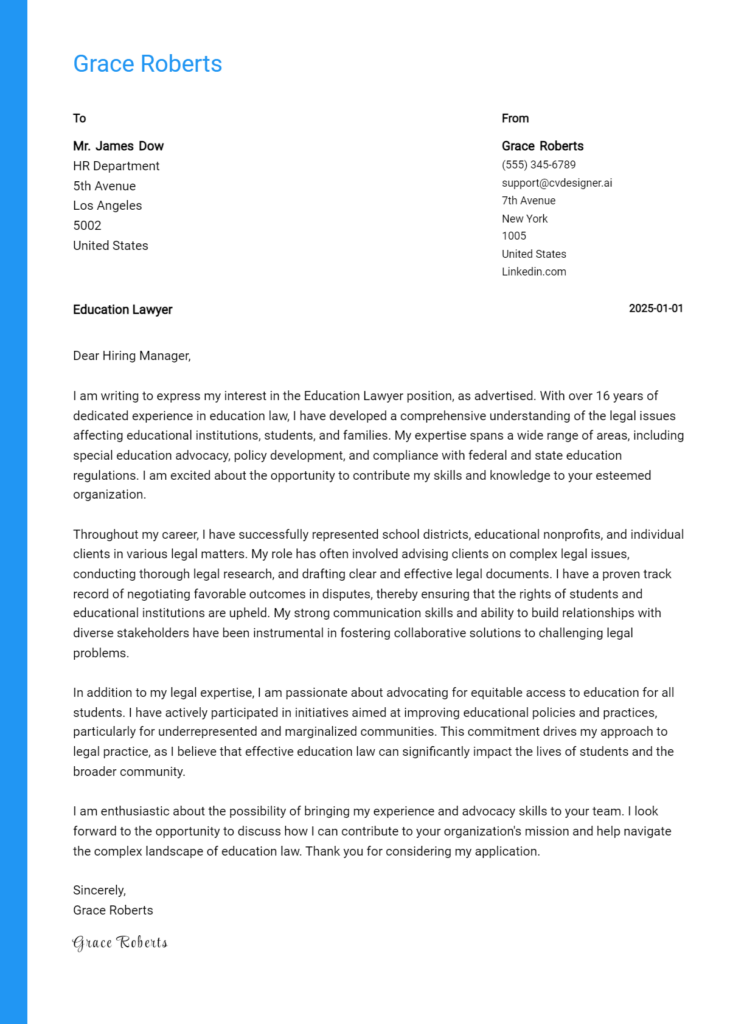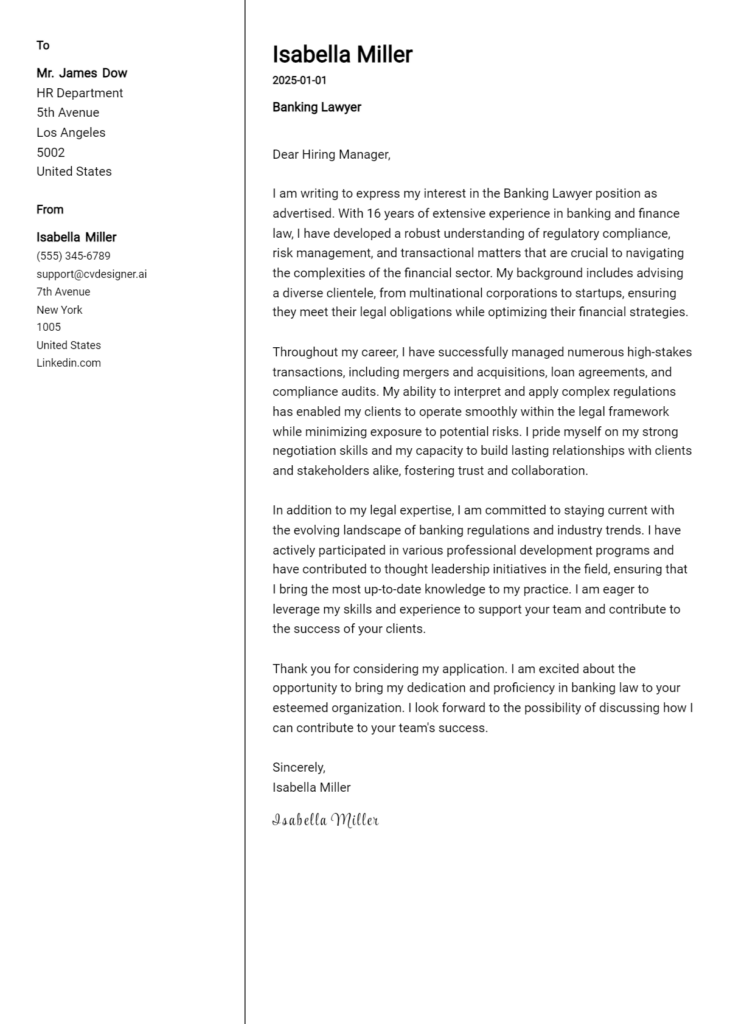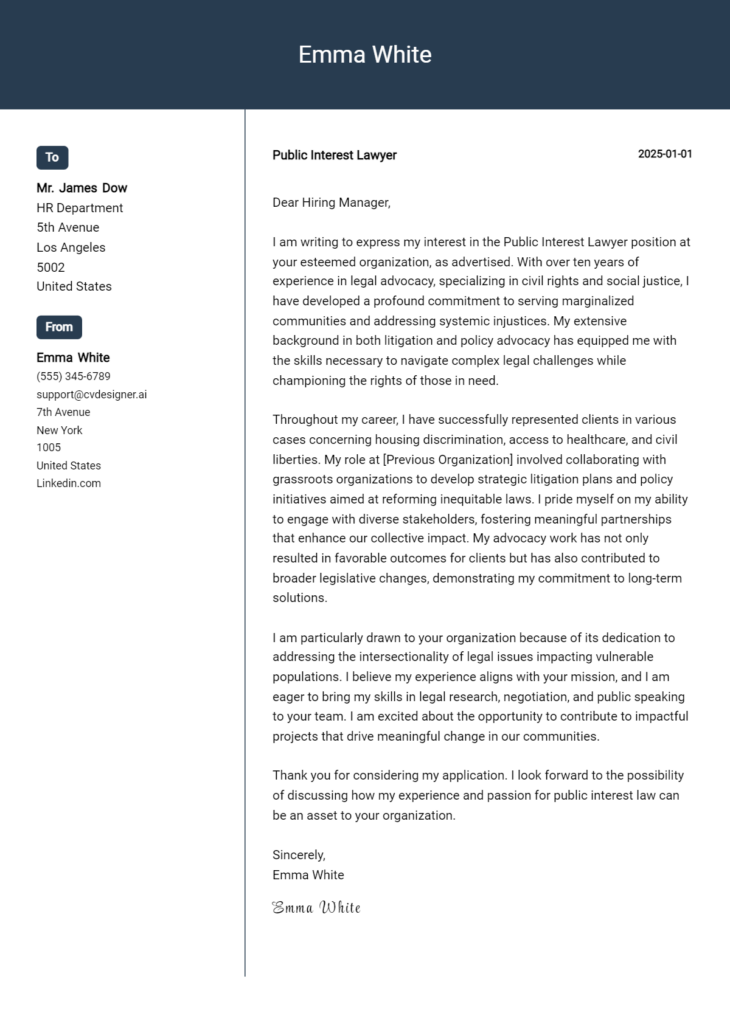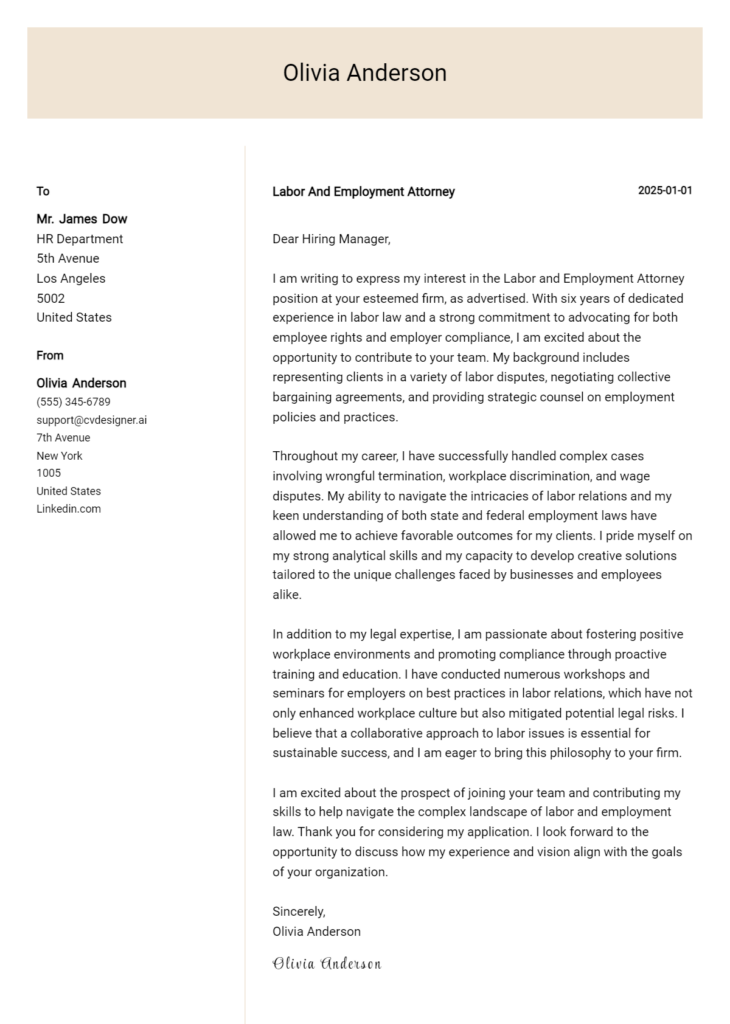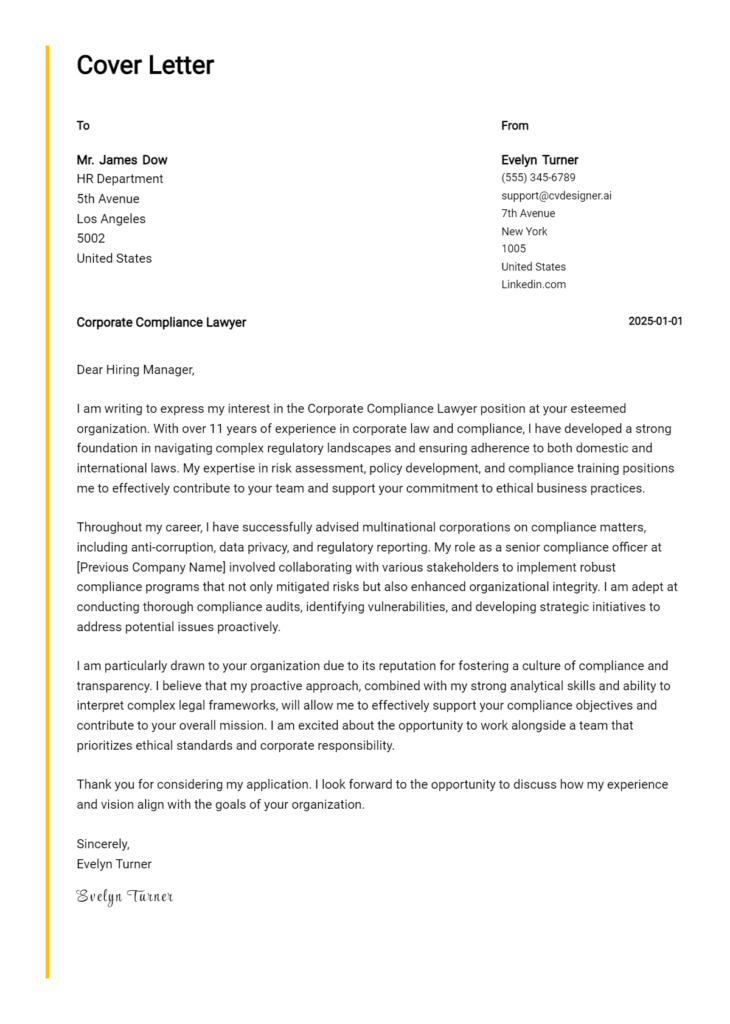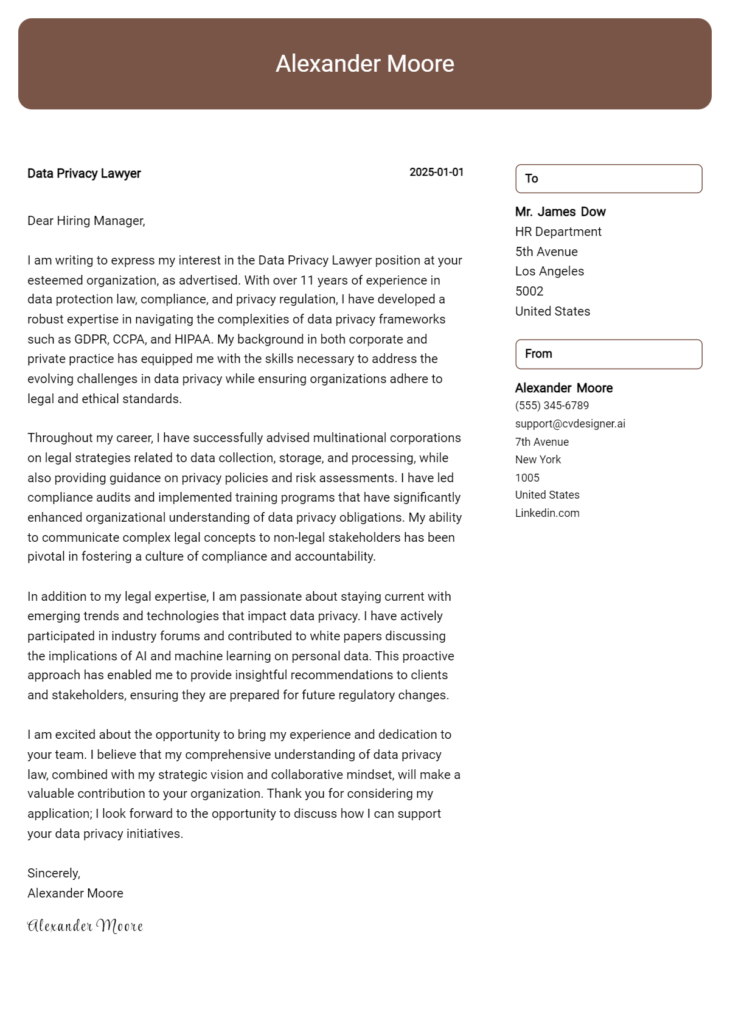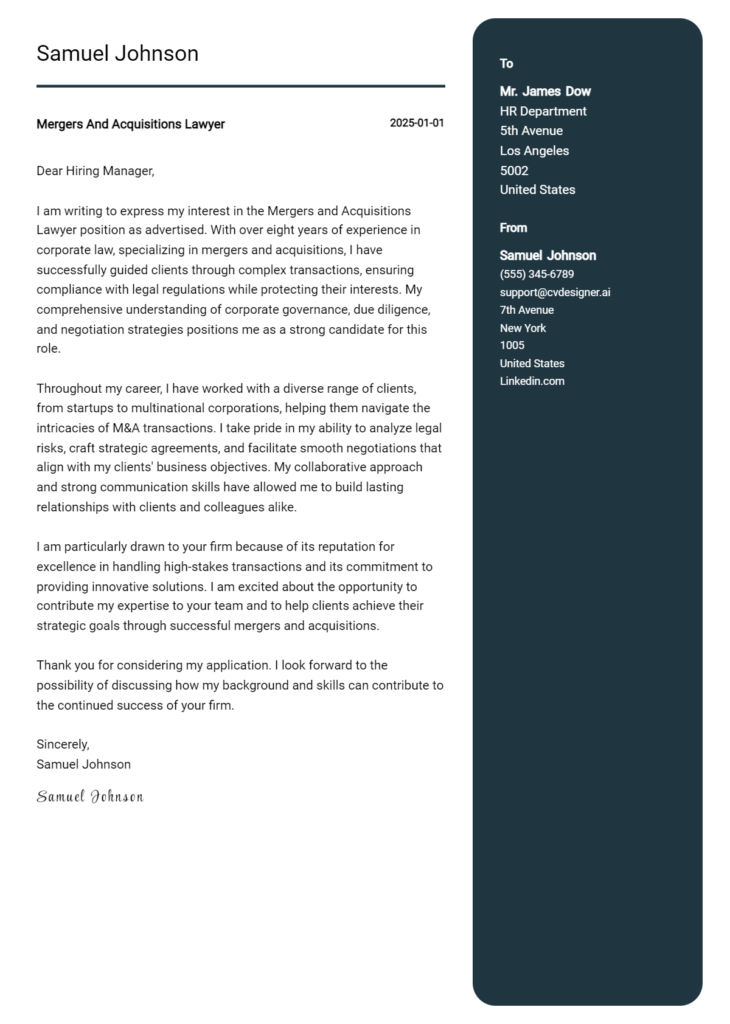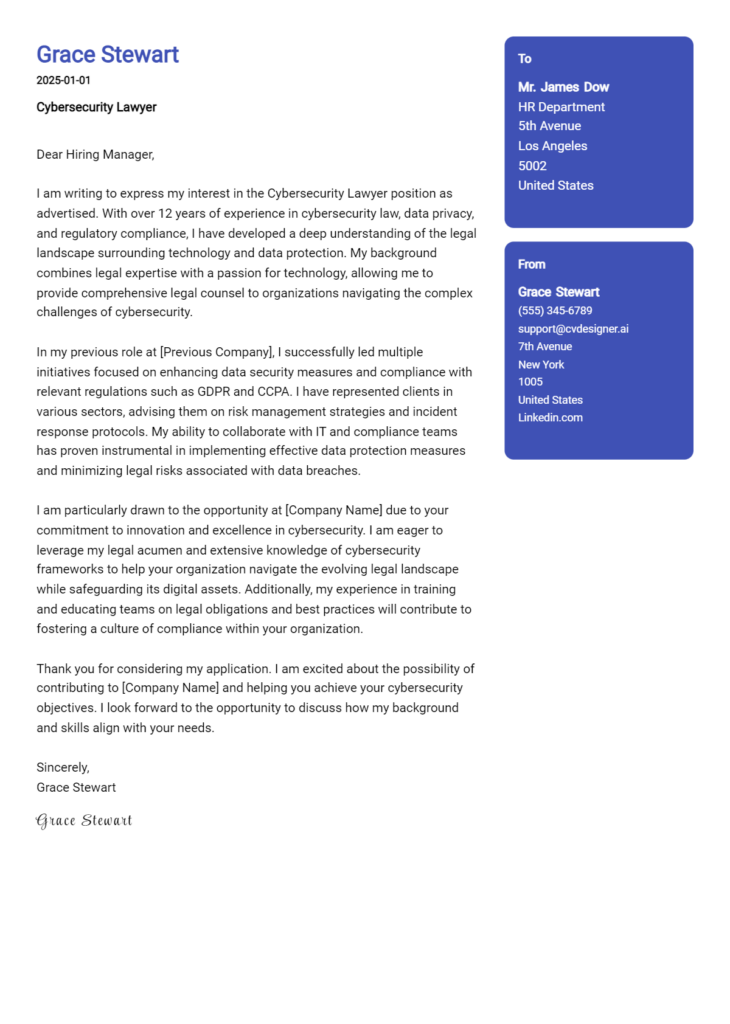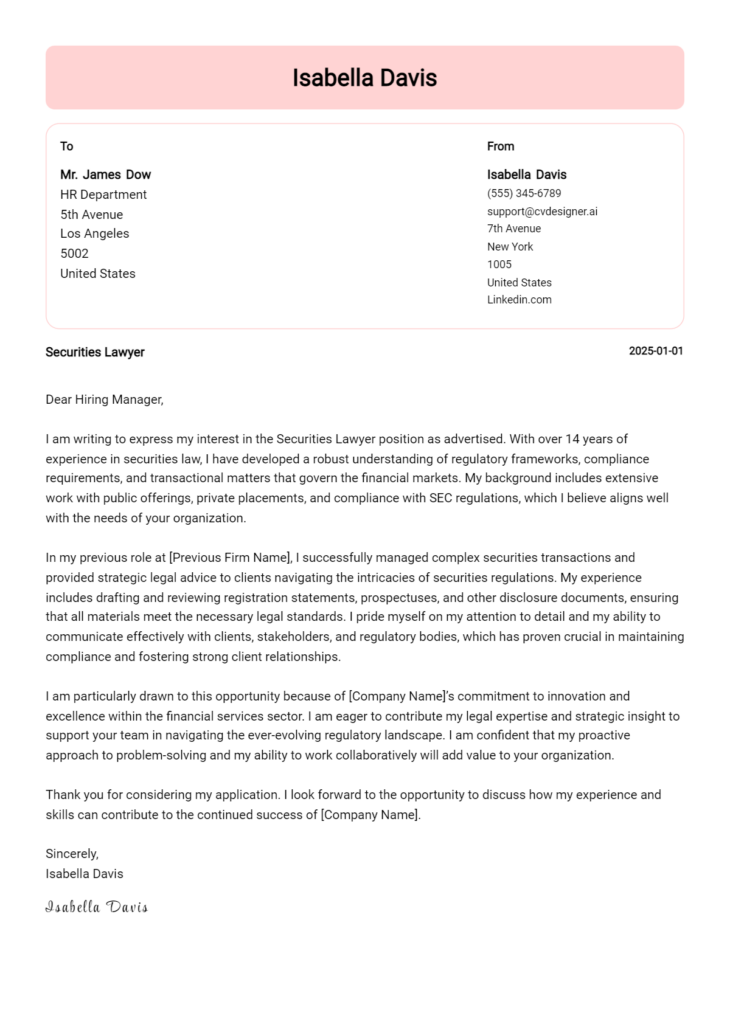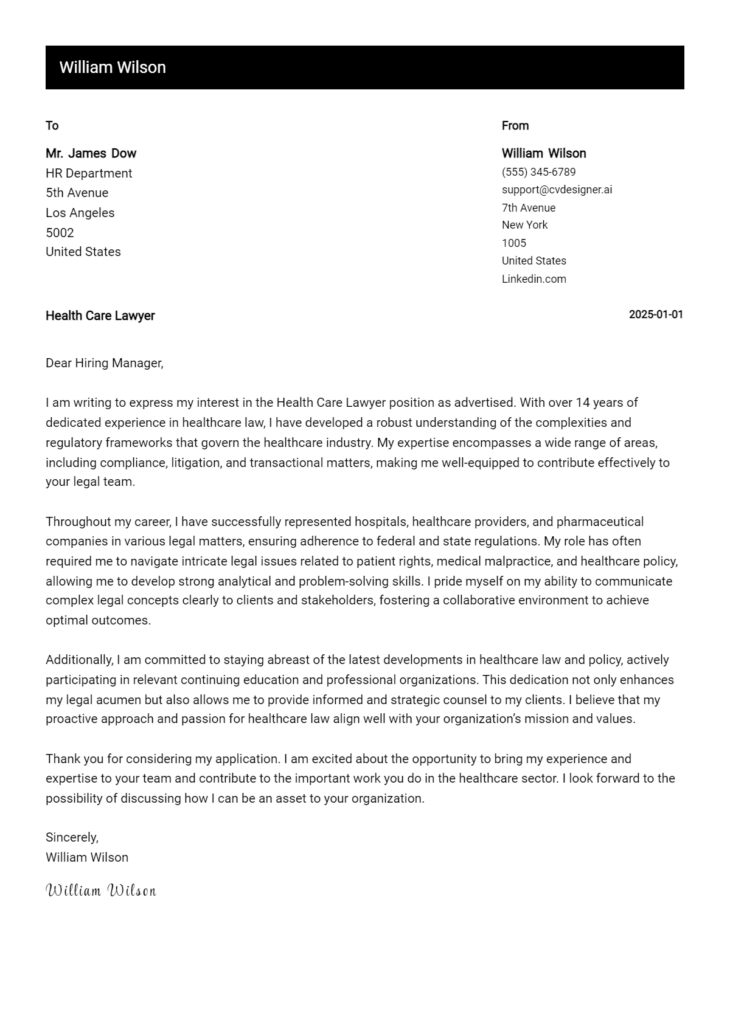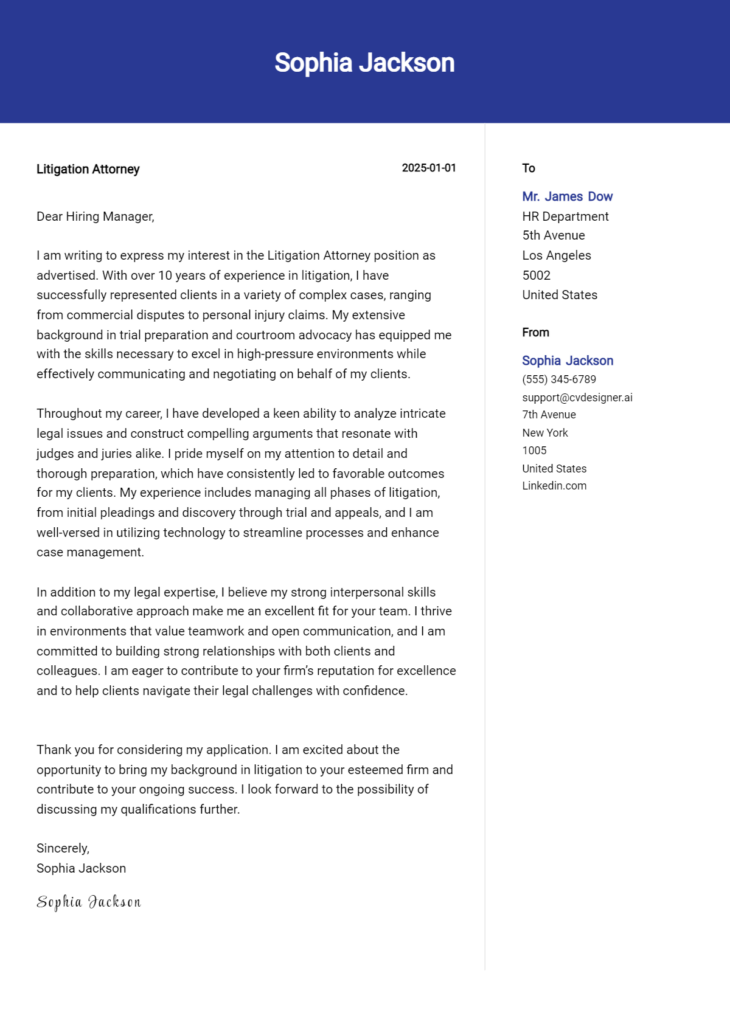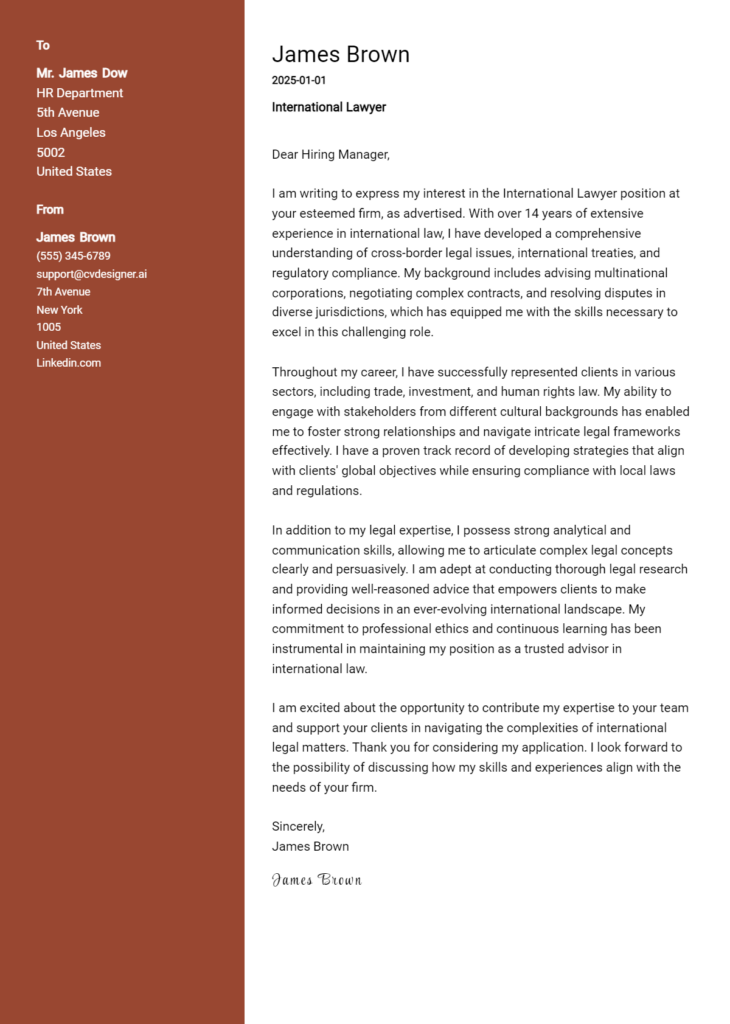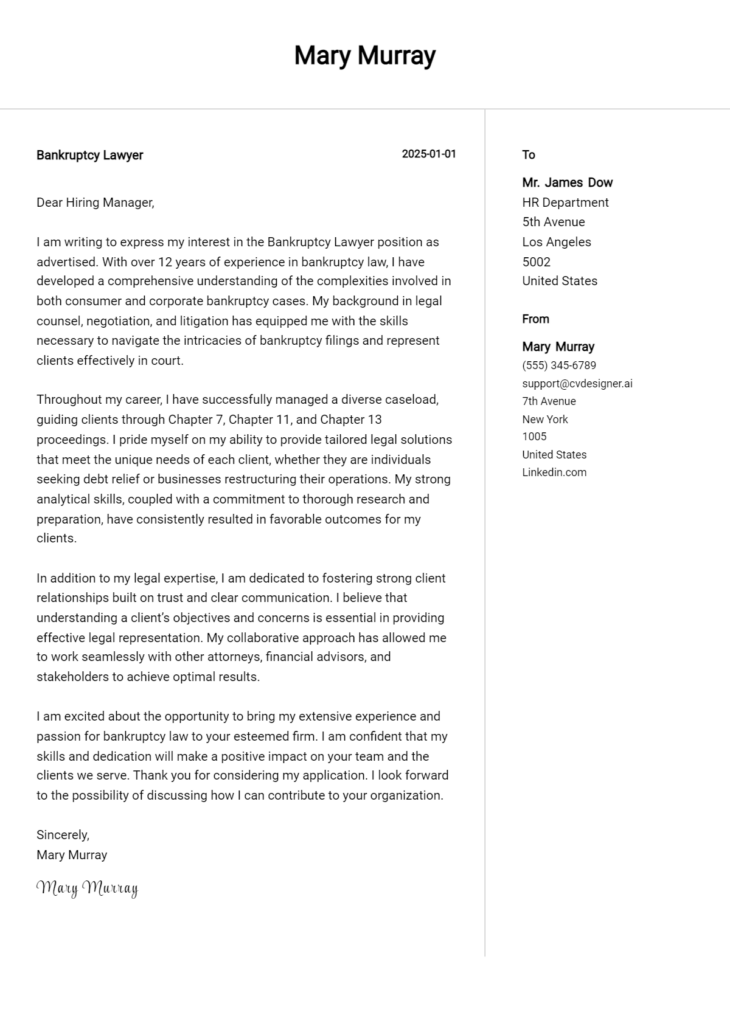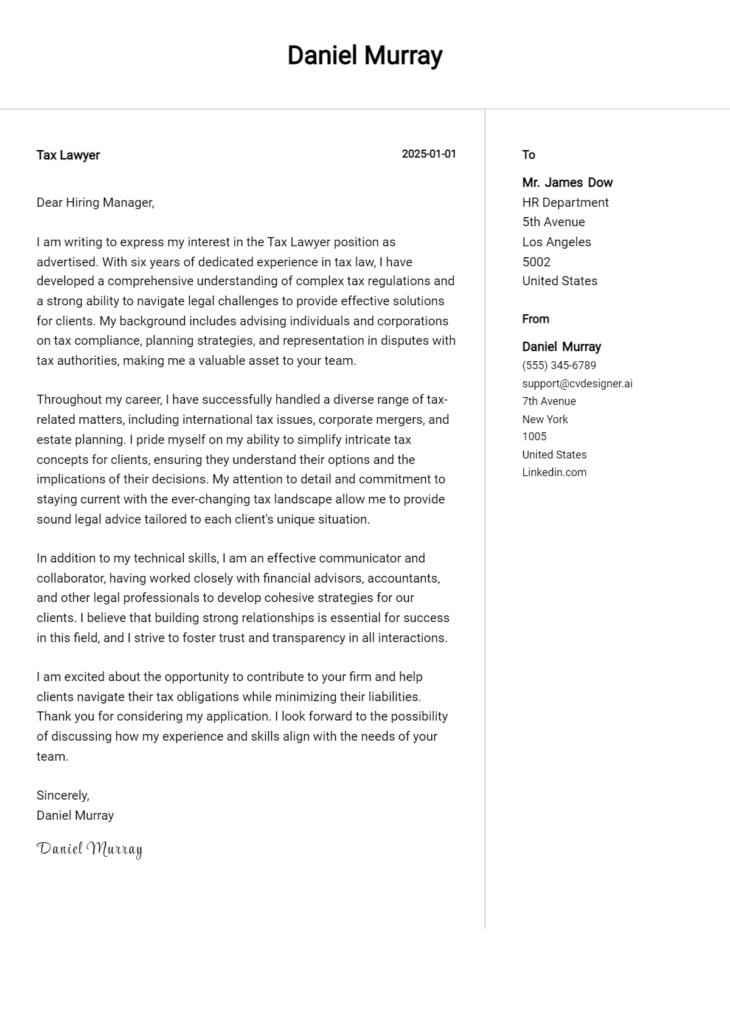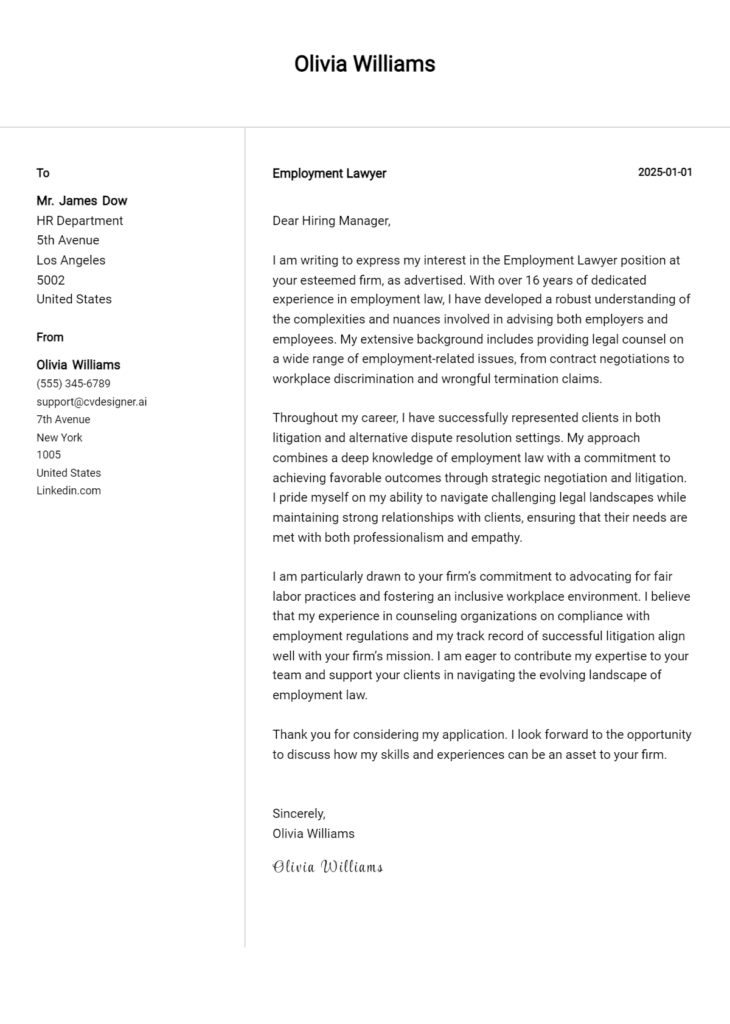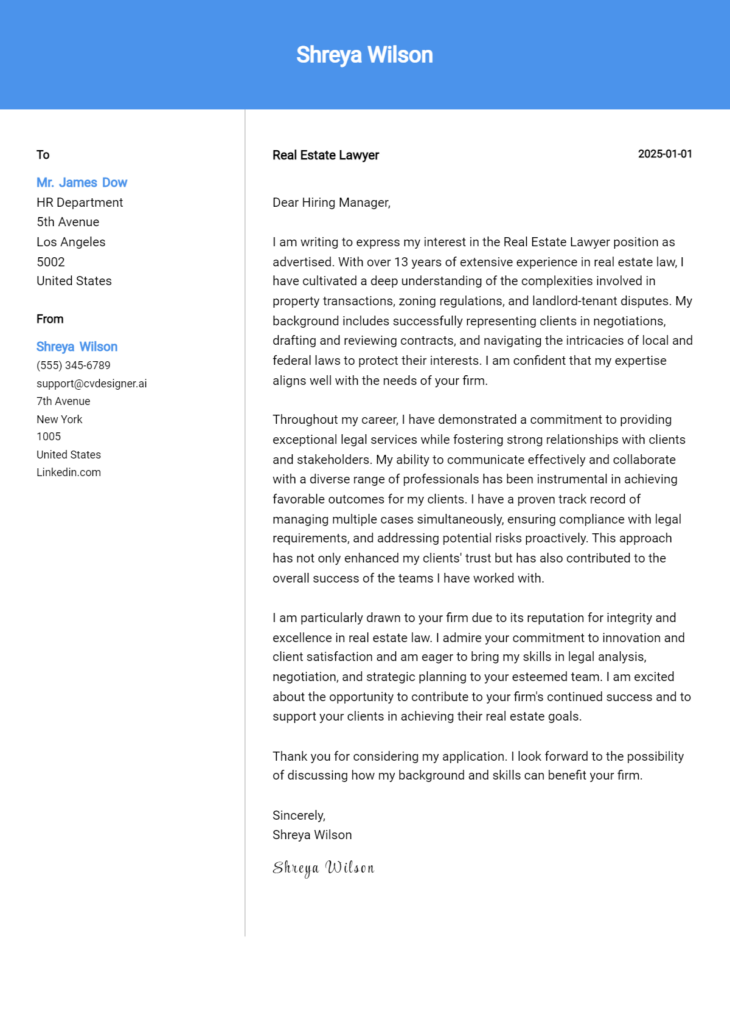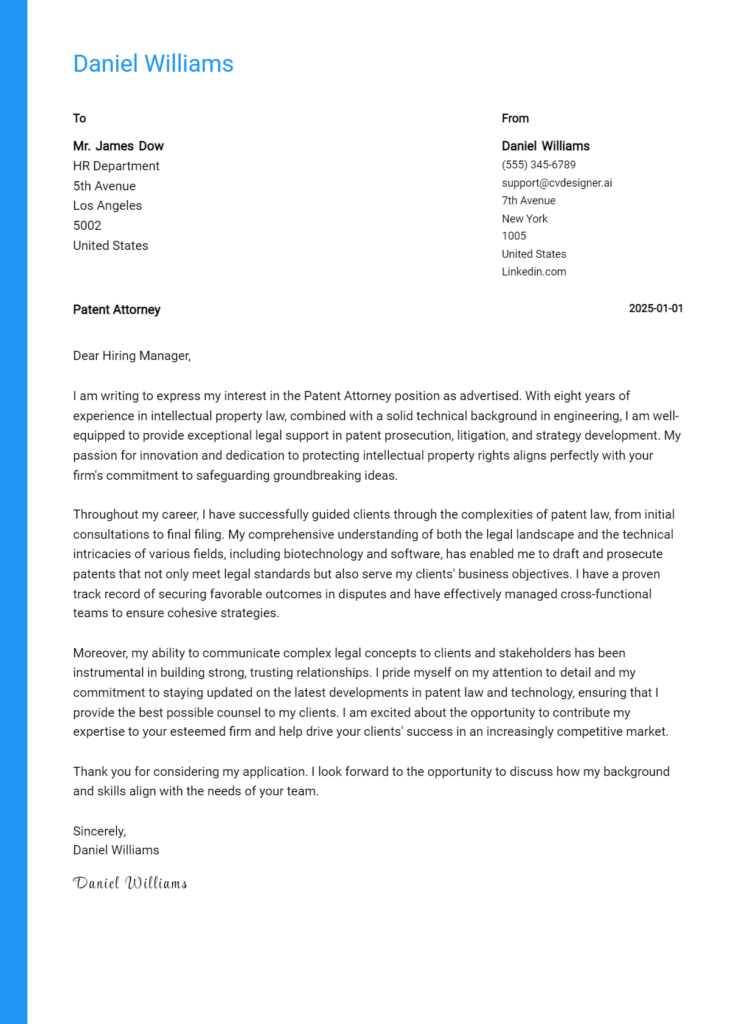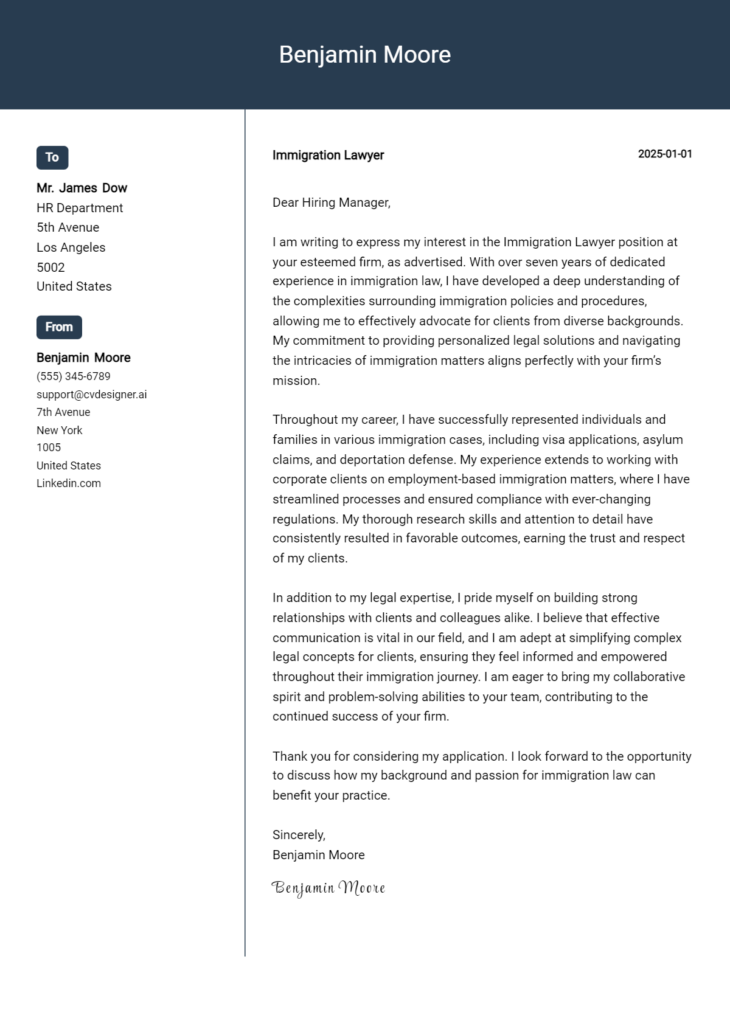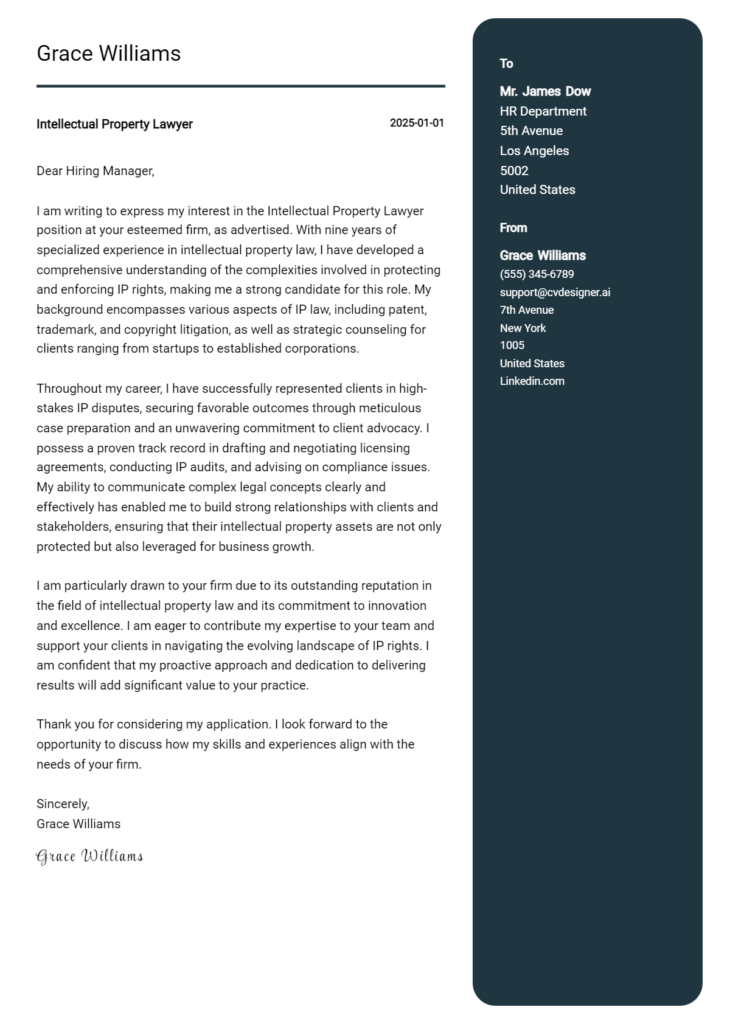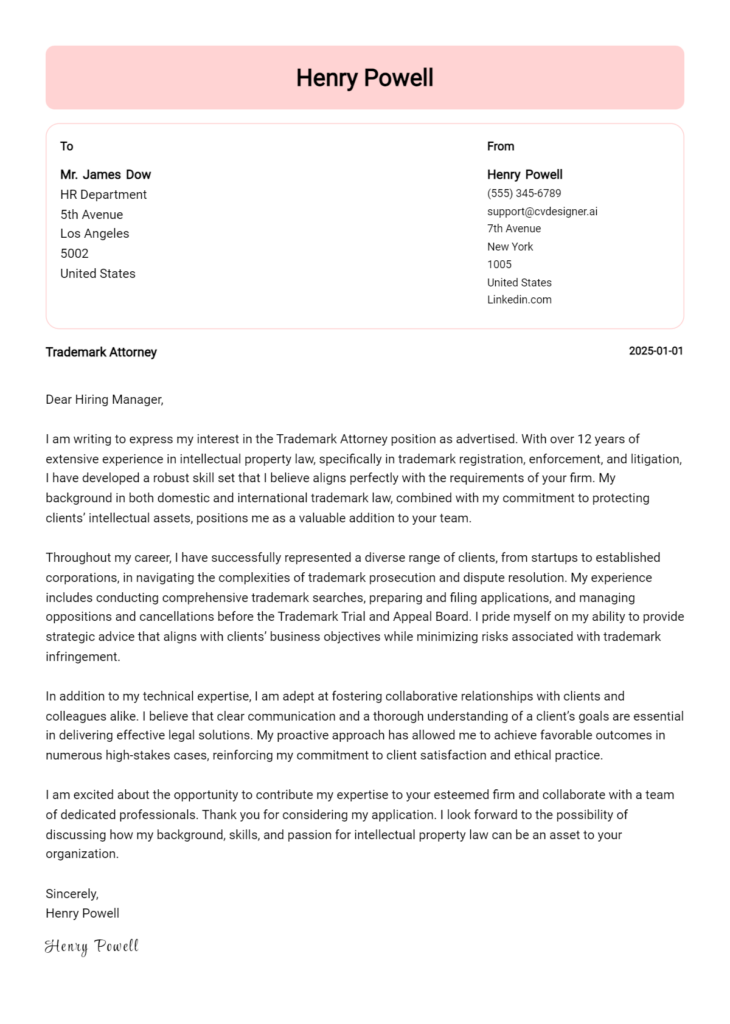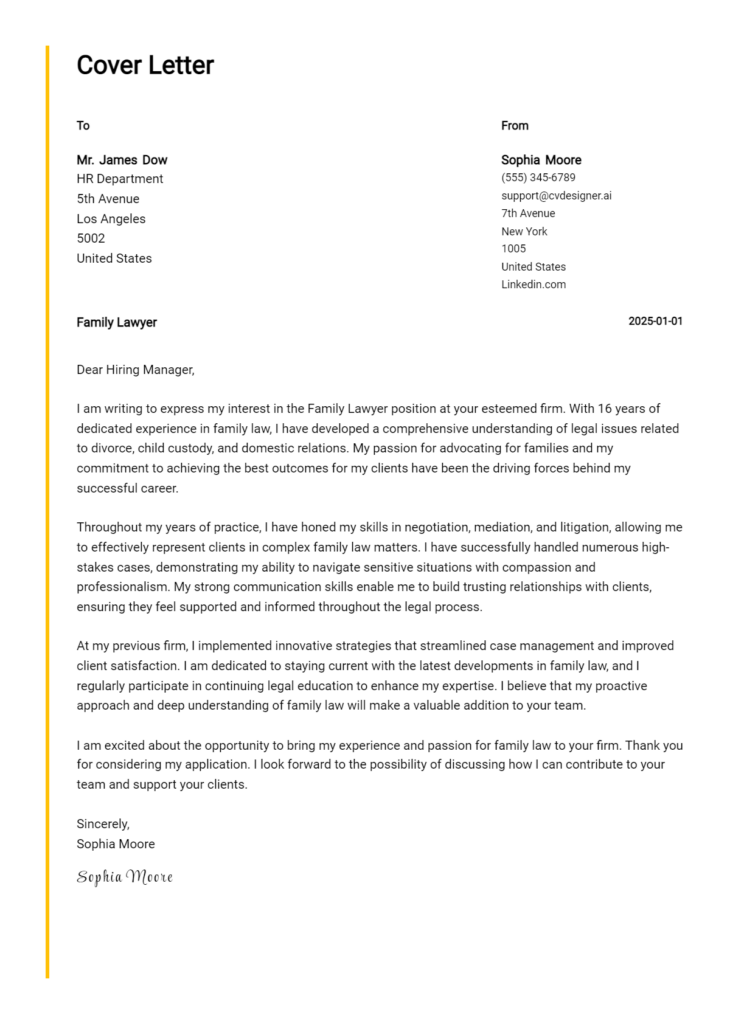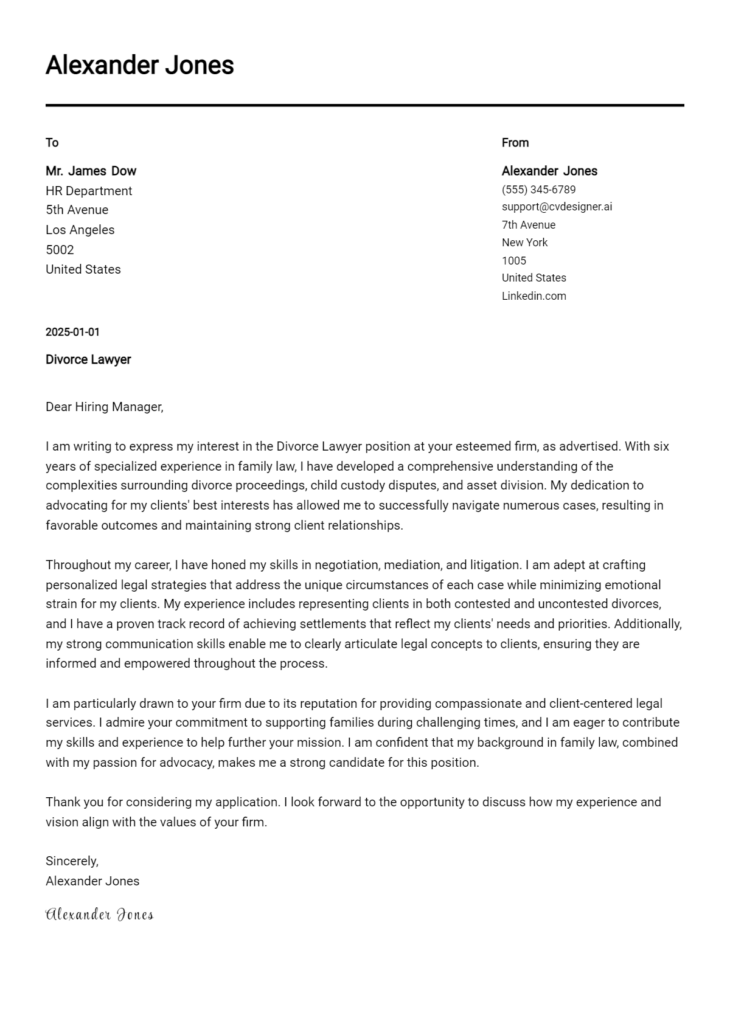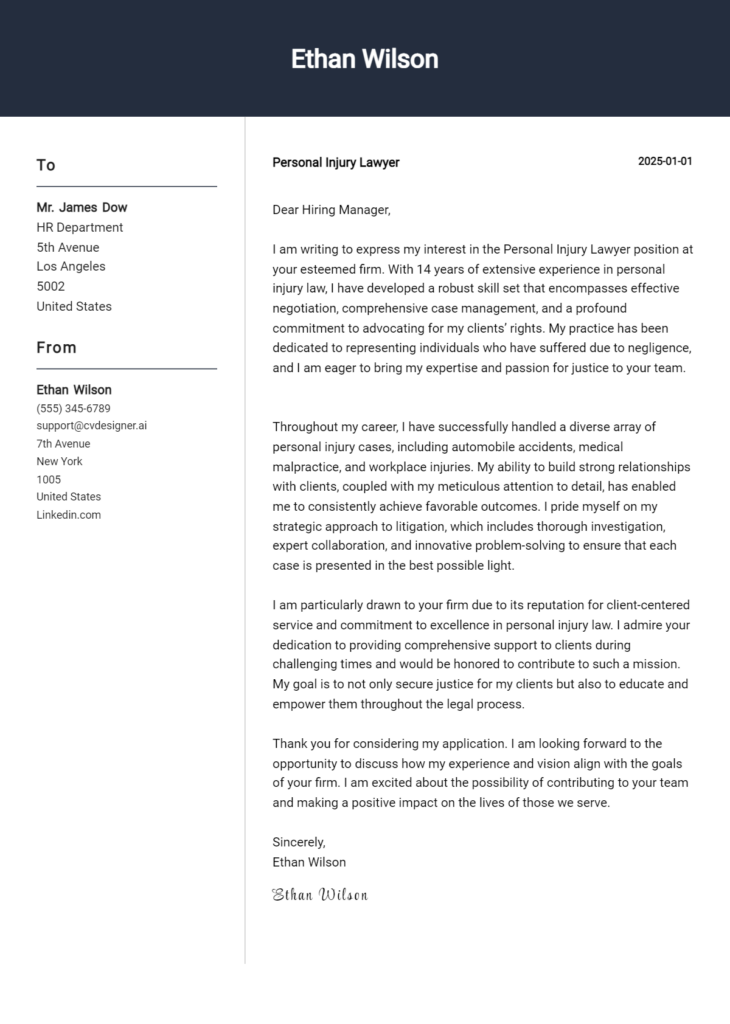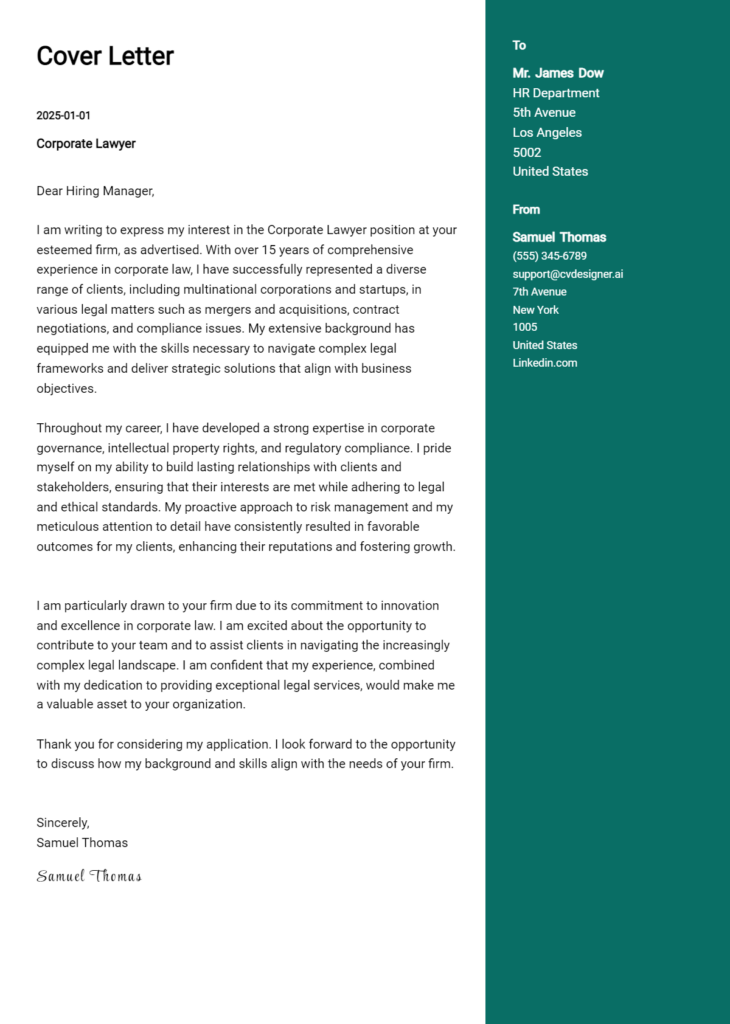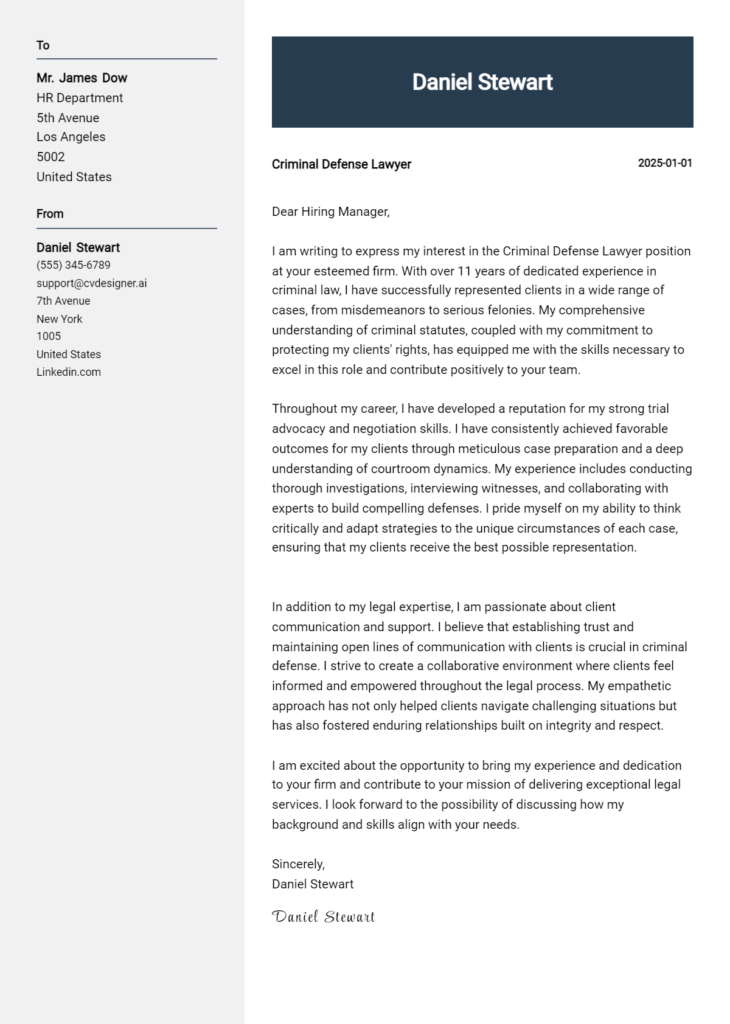Civil Rights Lawyer Cover Letter Examples
Explore additional Civil Rights Lawyer cover letter samples and guides and see what works for your level of experience or role.
How to Format a Civil Rights Lawyer Cover Letter?
Crafting a compelling cover letter is essential for a Civil Rights Lawyer, as it not only showcases your legal expertise but also reflects your commitment to justice and advocacy. The way you present your qualifications is crucial, as it demonstrates your ability to articulate complex issues and your dedication to civil rights. A well-structured cover letter captures the hiring manager's attention and establishes your credibility, which is vital in a field where persuasive communication is key.
In this guide, we’ll explore how to format your cover letter effectively, emphasizing the significance of each component in making a strong impression.
We will focus on the essential elements of a professional cover letter, including:
- Cover Letter Header
- Cover Letter Greeting
- Cover Letter Introduction
- Cover Letter Body
- Cover Letter Closing
Each section is instrumental in presenting your qualifications and professionalism. Let’s delve into each part and discuss how to craft a standout cover letter as a Civil Rights Lawyer.
Importance of the Cover Letter Header for a Civil Rights Lawyer
The header of a cover letter is crucial for establishing professionalism and clarity from the outset. For a Civil Rights Lawyer, the header not only serves as a formal introduction but also provides essential information that potential employers can use to contact you. It typically includes your name, address, phone number, email, the date, and the recipient's name and address. A well-structured header reflects attention to detail and respect for the hiring process, which are vital traits for a lawyer advocating for civil rights.
A strong header presents information in a clear and organized manner, while a weak header may lack essential details or appear disorganized, potentially leaving a negative first impression.
Strong Example
John Doe, Esq. 123 Justice Lane Civil Rights City, ST 12345 (555) 123-4567 johndoe@email.com October 15, 2023 Ms. Jane Smith Director of Human Resources Equal Justice Initiative 456 Liberty Avenue Civil Rights Town, ST 67890
Weak Example
johndoe@email.com 123 Justice Lane (555) 123-4567 October 15 To Whom It May Concern
The Importance of a Cover Letter Greeting for a Civil Rights Lawyer
The greeting of your cover letter is a crucial element that sets the tone for the entire document. A well-crafted greeting not only demonstrates your professionalism but also showcases your ability to personalize your application. By addressing the hiring manager directly, you establish a connection and show that you have invested time in understanding the organization and its values. To avoid generic greetings like "To Whom It May Concern," it’s essential to research the recipient's name, which can often be found on the firm's website or LinkedIn. A personalized greeting reflects your commitment to the position and can make a lasting impression.
Strong Greeting Example
Dear Ms. Johnson,
Weak Greeting Example
To Whom It May Concern,
The Importance of a Compelling Cover Letter Introduction for a Civil Rights Lawyer
A well-crafted cover letter introduction is crucial for a Civil Rights Lawyer, as it serves as the first impression a hiring manager will have of the candidate. This introduction should not only capture the reader's attention but also convey the candidate's passion for civil rights work, their qualifications, and specific achievements that make them an ideal fit for the position. An engaging introduction sets the tone for the rest of the cover letter, showcasing the candidate's commitment to justice and advocacy while effectively differentiating them from other applicants.
Strong Example
Dear [Hiring Manager's Name], As a dedicated advocate for social justice with over seven years of experience in civil rights law, I am excited to apply for the Civil Rights Lawyer position at [Organization Name]. My passion for defending marginalized communities and my proven track record of winning landmark cases, including [specific case or achievement], align perfectly with your mission to promote equality and fairness. I am eager to bring my expertise in litigation and grassroots advocacy to your esteemed team, ensuring that the voices of those deprived of their rights are heard and defended.
Weak Example
To Whom It May Concern, I am writing to express my interest in the Civil Rights Lawyer position. I have some experience in law and think I might be a good fit. I have done a few things related to civil rights but I am not sure what specific skills would help in this job.
Cover Letter Body for a Civil Rights Lawyer
The body of a cover letter for a Civil Rights Lawyer is crucial in demonstrating the candidate's unique qualifications, passion for social justice, and relevant legal expertise. This section allows the applicant to articulate their commitment to civil rights, highlight specific accomplishments, and provide examples of how they have successfully advocated for marginalized communities. By detailing specific projects, such as landmark cases or community initiatives, the lawyer can effectively convey how their skills align with the mission of the organization they are applying to, thereby illustrating their potential value to the company.
Strong Example
I am proud to have successfully represented a group of low-income families in a housing discrimination case against a major real estate developer. Through strategic negotiation and diligent research, we not only secured a favorable settlement for my clients but also helped to implement new policies that promote equitable housing practices in our community. Additionally, my internship at the American Civil Liberties Union provided me with invaluable experience in civil rights litigation, where I assisted in crafting legal briefs for a high-profile case that challenged unlawful surveillance practices. My dedication to advocating for justice and my proven track record in civil rights law make me an ideal candidate for your firm.
Weak Example
I have worked on a few cases and I think I would be a good fit for your firm. I really care about civil rights and have done some research on the topic. My previous job involved some legal work, but I can't remember the specifics. I am looking for a position where I can help people and make a difference.
Importance of the Cover Letter Closing for a Civil Rights Lawyer
The closing paragraph of a cover letter is crucial for a Civil Rights Lawyer, as it serves to summarize qualifications, reiterate enthusiasm for the role, and encourage the hiring manager to take action, such as reviewing the resume or scheduling an interview. A strong closing can leave a lasting impression and reinforce the candidate's commitment to advocating for justice and equality. Conversely, a weak closing may fail to convey passion or clarity, potentially losing the opportunity to make a meaningful connection with the employer.
Strong Example
Thank you for considering my application for the Civil Rights Lawyer position at [Organization Name]. I am eager to bring my extensive experience in advocating for marginalized communities, coupled with my deep commitment to social justice, to your esteemed team. I look forward to the opportunity to further discuss how my background and skills align with your mission. Please feel free to review my resume, and I would appreciate the chance to schedule an interview at your earliest convenience.
Weak Example
Thanks for looking at my application. I think I would be a good fit for the job. Please read my resume and let me know if you want to talk.
Writing an effective cover letter for a Civil Rights Lawyer position is crucial for standing out in a competitive field. This document should not only convey your qualifications but also showcase your technical skills, problem-solving abilities, and commitment to social justice. Additionally, demonstrating knowledge of the social development lifecycle (SDLC), your capacity for teamwork, and a passion for continuous learning can set you apart from other candidates. The following tips will guide you in crafting a compelling cover letter that highlights these essential attributes.
Tips for Writing a Cover Letter as a Civil Rights Lawyer
Highlight Relevant Experience: Clearly outline your previous roles and experiences that are directly related to civil rights law. Provide specific examples of cases you've worked on, issues you've tackled, or advocacy efforts you've led. This not only showcases your technical skills but also demonstrates your commitment to the field.
Showcase Problem-Solving Abilities: Civil rights law often involves complex challenges that require innovative solutions. Share an instance where you successfully navigated a difficult legal situation or developed a strategy that benefited your clients. Use quantifiable outcomes when possible to illustrate your impact.
Demonstrate Knowledge of SDLC: Understanding the social development lifecycle is essential for civil rights lawyers. Mention any relevant coursework, training, or practical experiences that illustrate your knowledge of SDLC principles and how you've applied them in legal contexts.
Emphasize Teamwork and Collaboration: Civil rights work often requires collaboration with various stakeholders, including clients, community organizations, and other legal professionals. Provide examples of how you've worked effectively in teams, highlighting your ability to communicate and collaborate to achieve common goals.
Express a Passion for Continuous Learning: The field of civil rights law is ever-evolving, and a commitment to professional development is vital. Mention any ongoing education, workshops, or seminars you've attended to stay current with developments in civil rights law. This shows your dedication to improving your skills and knowledge continuously.
By incorporating these elements into your cover letter, you can create a powerful document that not only showcases your qualifications but also reflects your passion for civil rights law. For more guidance, consider utilizing cover letter templates or a cover letter builder to streamline your writing process.
Common Mistakes to Avoid in a Civil Rights Lawyer Cover Letter
Crafting a compelling cover letter is essential for standing out in the competitive field of civil rights law. Avoiding common mistakes can significantly enhance your chances of making a positive impression. Here are some frequent pitfalls to watch for, along with tips to steer clear of them:
Generic Greetings: Using "To Whom It May Concern" can make your letter feel impersonal. Research the hiring manager's name and address them directly.
Lack of Specificity: Failing to mention specific cases or issues relevant to the organization can weaken your application. Tailor your letter to reflect the organization's mission and values.
Overly Complex Language: While it's important to demonstrate your knowledge, using overly complex legal jargon can alienate the reader. Aim for clarity and conciseness.
Neglecting Formatting: An unorganized letter can detract from your qualifications. Use a clear cover letter format to ensure your letter is easily readable.
Repetition of the Resume: Your cover letter should complement your resume, not repeat it. Use this opportunity to highlight your passion for civil rights and specific accomplishments.
Ignoring the Call to Action: Failing to include a strong closing statement can leave your letter feeling incomplete. Politely express your desire for an interview or further discussion.
Typos and Grammatical Errors: Mistakes can undermine your professionalism. Always proofread your letter or have someone else review it before submission.
By being mindful of these common mistakes, you can create a powerful cover letter that showcases your commitment to civil rights and your suitability for a legal position. For more inspiration, check out some cover letter examples to guide your writing.
Cover Letter FAQs for Civil Rights Lawyer
What should I include in my cover letter as a Civil Rights Lawyer?
Your cover letter should highlight your passion for civil rights and social justice, along with relevant qualifications and experience. Begin with a strong opening that captures your enthusiasm for the role. Include specific examples of past cases or projects that demonstrate your commitment and expertise in civil rights law. Mention any relevant education, certifications, or memberships in legal associations focused on civil rights. Additionally, tailor your letter to the organization, reflecting an understanding of their mission and values. Conclude with a clear expression of your desire to contribute to their efforts and a call to action for an interview.
How can I demonstrate my commitment to civil rights in my cover letter?
To demonstrate your commitment to civil rights, provide concrete examples from your professional background that showcase your advocacy work. This may include pro bono cases you've taken on, participation in civil rights organizations, or involvement in community outreach programs. Discuss any specific legal battles or initiatives where you fought for marginalized groups or issues, detailing the impact of your work. Additionally, you can reference any publications, presentations, or continuing education you've pursued in this field. This not only underscores your dedication but also positions you as a knowledgeable and passionate candidate.
Should I address any specific skills in my cover letter?
Absolutely! Highlighting specific skills in your cover letter is crucial, especially those that are particularly relevant to civil rights law. Focus on skills such as strong legal research and writing abilities, effective negotiation techniques, and courtroom experience. Additionally, emphasize your skills in advocacy, public speaking, and community engagement. If you have experience with legal technology or case management systems, mention these as well. Tailor your skills to align with the requirements of the job description, demonstrating how your unique skill set makes you an ideal candidate for the role.
How can I make my cover letter stand out in a competitive field?
To stand out in a competitive field, focus on crafting a compelling narrative that reflects your unique experience and perspective. Start with a personal story or anecdote that illustrates your passion for civil rights, drawing the reader in. Use a professional yet engaging tone, and avoid generic language; instead, incorporate specific details that highlight your achievements and contributions to civil rights causes. Research the organization you’re applying to and mention specific initiatives or values that resonate with you. Finally, ensure your cover letter is meticulously edited and free from errors, as professionalism is key in the legal field.
Build your Cover Letter in minutes
Use an AI-powered cover letter builder and have your letter done in 5 minutes. Just select your template and our software will guide you through the process.

